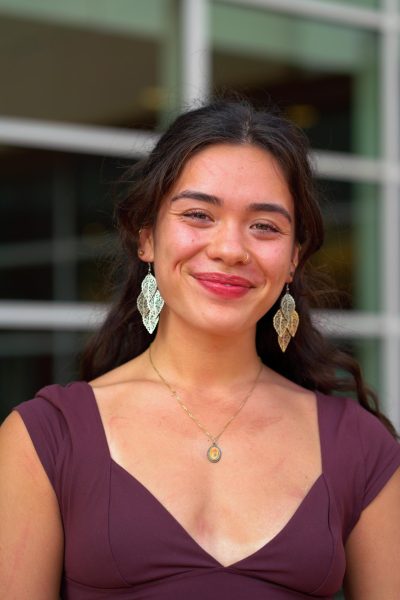Subject: Community Notification
“Dear Campus Community,
The Office of Diversity, Equity, and Inclusion, in collaboration with the Division of Student Affairs, is currently investigating and responding to a reported bias-motivated assault on campus that took place on Saturday, Nov. 2. We want to thank the students who immediately reported the incident; this models the community citizenship that demonstrates Grinnell College’s values.”
* * *
“We were drowning under the weight of responsibilities that should have never been ours to carry. When I signed up to be part of the cab, I was looking forward to organizing fun events for students, not becoming an unofficial Imam, administrator, and advocate for my peers. As a Muslim student, I needed an advocate too.”
* * *
Question what’s possible.
The caption overlays a smiling photo of my older sister, Ella Kumano-Maloney `23, and Zoe Robinson `23 — both students of color. The photograph was snapped during an intro to anthropology class, and the pair look like models of student excellence. Ella grins while gazing inquisitively upwards, and Zoe smiles with a blue Expo marker in hand. The additional subtext behind the photo is obvious — Grinnell is diverse!
It is this advertisement that greeted me at the Des Moines airport arriving for my first year at Grinnell in 2021. My sister shook her head as we passed it. “They did me so dirty.”
Indeed, they did do Ella dirty with that photo; both with the angle and the angle (Love you, Ella).
As someone who is half Japanese and half white, I feel like the epitome of palatable diversity. Once, a white lady at the Grinnell Pub said I looked like “Moana? Pocahontas. It’s the cheekbones. You’re a little bit ethnic, aren’t you?” When she spoke those words, my heart soared. In that moment, I felt crowned as Grinnell’s palatably diverse princess. No need for communion wine when a white lady can spill her Blue Moon on you instead.
But what is palatable diversity? I thought you’d never ask. Palatable diversity is a form of diversity that I argue is accessed through a combination of respectability politics, desirability politics, colorism and featurism. It is characterized by a proximity to whiteness that blankets white people with the comfort of feeling someone is an “approachable” person of color.
Put plainly, it is the privilege of being perceived as “not too ethnic.”
Believe me, I’m grateful for the opportunities that Grinnell has afforded me; as a work-study student of color, it is through the grace and guidance of faculty and staff that I have been able to balance the exhaustion of academia and employment (thank you for making Grinnell my home). However, I am cognizant that as a multiracial woman of white and Japanese descent, I have been able to exist within Grinnell as a “palatably diverse” person of color (PDPC).
As a PDPC, my proximity to whiteness has granted me privileges often denied to others who are further removed from it. It is a privilege that lets me receive deliciously fetishistic compliments from “open-minded” people such as, “I want to have a mixed-kid someday…” It is a privilege that lets me hear the thoughts of those unwilling to speak to “scarier” people of color: “I don’t know, like, I know that Black students can be…”
It is a privilege that lets me float through some spheres of whiteness whilst remaining a person of color in my identity. It is easy to simply accept these privileges. However, palatable diversity and the privileges it affords are born out of a history of exclusion of people less proximate to whiteness.
Grinnell, as an institution, craves palatable diversity — because, let’s face it, education just goes down smoother with a little spice. The vegan meat of a liberal arts education pairs perfectly with the well-aged wine of curated multiculturalism. Diversity isn’t just a value here; it’s a key ingredient in Grinnell’s marketing recipe, plastered all over the College’s menu — sorry, homepage.
Scrolling through the Grinnell College website, an onlooker is greeted by the cheerful faces of students, many of whom are students of color. Grinnell is happy to use the diversity of its student body to sell its liberal fantasy. In the words of Melanie Oden `25, “The photographer is here. People of color—scatter!”
On the “Grinnell at a Glance” and “Why Grinnell” pages, the College touts “diverse community” and “social responsibility” as two of their core values. Crucially, this claim to diverse community and social responsibility relies on the exploitation of students. Due to limited administrative safety measures, the social responsibility of safety relies on the general student body to “[model] community citizenship that demonstrate Grinnell College’s values,” to quote the College in their own email sent out on Nov. 6. And when further safety and support are needed, it is up to students of color to call for collective action for their own protection.
Following hateful incidents that affect marginalized communities, the College administration has a history of delayed response and inaction. For example, in October of 2022, vandalization of cars with racist slurs and imagery sparked a series of student-led initiatives to protect Black students on campus. Collective efforts, along with a list of ten demands produced by student groups and delivered to College higher ups, eventually led to a message from administration and some temporary safety lights and a few cameras on 8th and 10th Aves. However, the burden of organizing and advocating for basic safety fell entirely on Black students, and two years later, the full list of demands remains unmet. Grinnell’s “social responsibility” emerges from the exhaustive efforts of students who are further exploited to provide a “diverse community.”
Grinnell’s advertisements showcase smiling students of color, and Grinnell boasts the accomplishments of its Multicultural Leadership Council (MLC) student groups. However, upon closer inspection, the support Grinnell provides to student groups and the members themselves reveals itself to be a superficial scaffolding.
Moreover, MLC student groups are tasked with putting together the cultural community and events that Grinnell so proudly advertises. Consider events such as 90s Harris, Reggaeton, Food Bazaar, Drag, Diwali, Holi, Bollywood Gardner, AAA Potluck, Lunar New Year, Soul to Seoul — these are events initiated and run by MLC student groups. While the the crafting of and the cultural knowledge required for these events are best left to students within respective MLC communities, the labor of dealing with administrative confusion is exhausting. The result of this student initiative is a pool of cultural wealth which Grinnell extracts from for marketing a “diverse community” without offering meaningful support for students when they need it the most.
Time and time again, Grinnell fails to meet the basic needs of the “diverse community” it champions. For example, following the departure of the College’s Imam, student members of the Muslim Student Association were left to cover the responsibilities and fill the Imam’s role of spiritual leadership.
According to Istar Abdullahi `25, a leader of the Muslim Student Association, “We went more than half of the spring semester without an Imam, which was really difficult because Ramadan falls during then. MSA leaders had to pick up many of the responsibilities that generally the campus Imam would be work on — like, two of our cabinet members would spend up to 5 hours a week just preparing for Friday prayers, which really took a toll on them. I remember one of them being concerned with leading the prayer correctly and taking time out of his busy schedule to prepare khutbas for the prayer.”
The burden to fill these institutional gaps inevitably falls on students of color. As Abdullahi recounts, “We were drowning under the weight of responsibilities that should have never been ours to carry. When I signed up to be part of the cab, I was looking forward to organizing fun events for students, not becoming an unofficial Imam, administrator and advocate for my peers. As a Muslim student, I needed an advocate too.”
Here lies the crux of the issue: when marginalized students seek support beyond surface-level statements of solidarity, the silence that follows screams, “We only want you when you are palatable.” Diversity is embraced only to the extent that it can be commodified without challenge. But marginalized students deserve more. No one should not have to juggle the weight of demanding their rights alongside the already overwhelming responsibilities of academics. Protections of and provisions for minoritized students must be a priority.
Our humanity is not palatable — it is precious. Whether Grinnell will live up to its “social responsibility” and defend its “diverse community,” only time will tell.
In the meantime, let’s embrace the wisdom of my favorite Des Moines International Airport advertisement:
Question what’s possible.
Thank you to Istar Abdullahi `25, Arsema Berhane `22, Melanie Oden `25, Lily Piede ‘26, Ella Kumano-Maloney `23, Xavier James `25 and Emma Myers-Rafferty `25 for the conversations and insights that made this op-ed possible.


















































